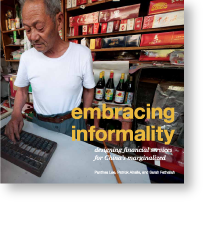Exploring Financial Inclusion in China
Hundreds of millions of migrant workers have flocked to Chinese metropolises in search of opportunity. But financial access has not kept pace with this increasingly transient population.
Citizens at the bottom of the economic pyramid lack even the most basic means to save for their children’s education, make purchases on credit, protect their homes through insurance, and send and receive money. Financial exclusion prevents many of them from realizing their potential and improving their livelihoods.
We found that…
Through applied ethnography, we dove into the daily lives of China’s marginalized. We traveled to urban, rural, and remote areas of the country, from Beijing and Inner Mongolia in the north to Yunnan and Guizhou provinces in the south. We interviewed over 100 respondents from three broad groups: migrant workers, rural villagers, and ethnic minorities. They included farmers, construction workers, shop owners, students, village leaders, sex workers, and loan sharks.
We learned that…
China’s marginalized rely on informal service relationships that are foremost rooted in trust, born of mutual reliance, and built on powerful and longstanding social connections. Too often, service providers create new offerings with a narrow focus on feature set, cost, or market opportunity, without considering how to address the needs of the populations they seek to serve. Current practices and the motivations behind them must also be taken into account.
And here’s what we’re doing about it…
We created a design concept for a market-based mobile remittance service to spark discussions about how to better serve the financial needs of China’s marginalized. Branded M-Fu, our prototype illustrates how a new mobile remittance service targeting China’s migrant workers could be operationalized. Building on existing behaviors and networks, M-Fu (Fu means “to pay”, “to deliver”, or “to entrust” in Mandarin) provides a template for a safer, more secure, and inexpensive way for China’s poor to send and receive money.

